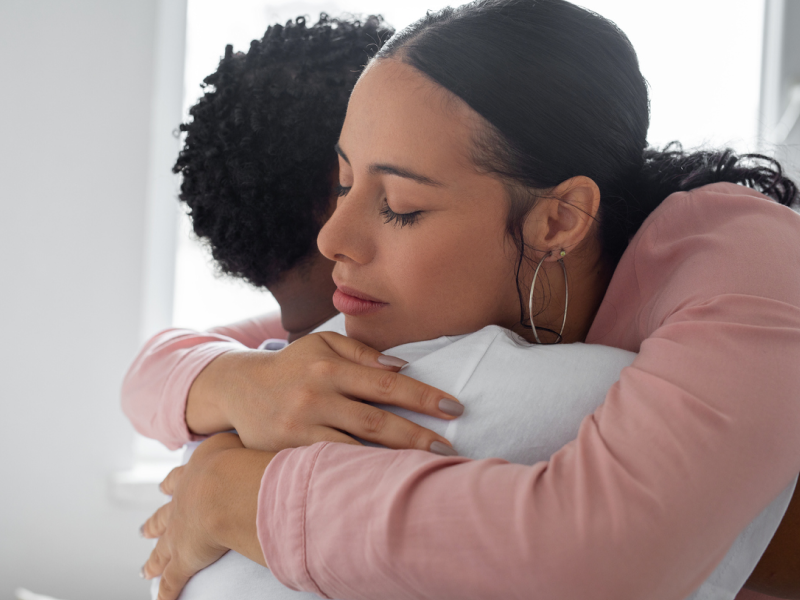
Table of Contents
How to Help Someone with Debilitating Anxiety

Written By: Dr. Rasna Kaur Neelam

Clinically Reviewed By: Dr. Don Gasparini
June 9, 2023
10 min.
Anxiety disorders involve feelings of fear, unease, or panic that interfere with an individual’s life. In this article, we review common anxiety disorders and discuss what you should (and shouldn’t) do to help someone with debilitating anxiety.
Learn more about our Clinical Review Process
Table of Contents
Anxiety disorders have become increasingly common in the United States. For some people, though, anxiety can escalate and get in the way of school, work, relationships, and more. At this point, an anxiety disorder may be described as “debilitating anxiety”—not a clinical diagnosis in and of itself, but rather an explanation of the anxiety disorder’s severity.
If a loved one is dealing with debilitating anxiety, the good news is that there are ways you can help. Here’s what you need to know about supporting someone with debilitating anxiety and some advice on what to avoid.
How can you help someone with debilitating anxiety?
Some people may only seek anxiety support when dealing with debilitating symptoms. If a loved one comes to you for help with debilitating anxiety, the best thing you can do in the long run is support them in finding professional mental health support. In the short term, though, there are things you can do to help them manage the symptoms of debilitating anxiety. Below are some ways you can support a loved one in better managing debilitating anxiety symptoms:
Environment
Someone’s environment includes the people they interact with and the location they live and work in. While you cannot fully control another person’s environment, you can create a supportive environment when you are with someone experiencing anxiety. To do this, make sure you are actively communicating with this person. Listen to what they say and validate their experiences. Be patient with people who have struggled with anxiety for a long time and don’t seem to be improving.
Education
If a loved one is experiencing anxiety, it might be helpful to learn more about their condition, especially since anxiety disorders manifest in different ways. OCD and PTSD, for example, may look completely different but are still characterized by feelings of stress and panic. By educating yourself about a loved one’s condition, you may be more attuned to symptoms, can help them avoid triggers, and can practice calming techniques together.

Personalized anxiety treatment
Designed for teens and young adults with complex mental health issues.
Professional help
If it is appropriate, encouraging a loved one to seek professional help is a good idea. A licensed clinician can often offer objective help and services that a family member or friend cannot. Many individuals may resist seeking care due to cost, lack of cultural competency of healthcare professionals, or shortage of clinicians in their area. That is ok, and their wishes should be respected. In severe cases where an individual may be at risk of harming themselves or others, contacting the suicide hotline at 988 is always an option.
Health and self-care
Self-care is a great way to manage your stress as a caretaker while helping reduce anxiety levels in a loved one. Self-care looks different for everyone, For some, it is going for a walk. For others, it is cooking or baking. Try to carve out time on your calendar for self-care and to prioritize this so that self-care doesn’t always come last on your to-do list.
Daily tasks
Sometimes, helping with small daily tasks can help lower the mental burden of a person with anxiety. Ask your loved one what you can do to support them. This might mean setting reminders for medications, going grocery shopping with someone who is scared of crowded environments, or checking in on a friend who stated they wanted to exercise more. Asking someone how best you can show up for them shows them that you care. At the same time, you want to make sure that you are keeping up with your daily tasks and not depleting your energy.
Reducing triggers
Learning about a loved one’s triggers can help you better understand why they act the way they do. In the short term, you can try to help them avoid these triggers. In the long term, though, it’s important to encourage your loved one to seek therapy that specifically addresses their triggers.
What should you not do when trying to help someone with debilitating anxiety?
Learning to interact with and care for someone with debilitating anxiety can be difficult. And if the person is someone you spend lots of time with —like a family member, romantic partner, roommate, or close friend— make a mistake. Making a mistake is ok and is something you can easily apologize for and correct. In the below section, we discuss some things to avoid when interacting with people who have debilitating anxiety.
Judgment
Judging someone for their mental health condition is not an appropriate way to allow someone to heal. In the same way that you would not judge someone with a broken arm, it is unkind and illogical to judge someone who has an anxiety disorder. Anxiety disorders are not caused by “weakness” but rather are caused by a combination of environmental factors, upbringing, genetics, and more.
Dismissing feelings
Dismissing the severity of someone’s anxiety does not do you or the other person any favors. When you tell someone to just “relax” or “get over” their anxiety you create a barrier that can hinder mutual understanding. Instead, try to empathize with what they are going through or ask them how they feel and how you can help.
Enabling
It is common to enable loved ones with anxiety because we want to protect them from harm or distress. But in reality, anxiety tends to persist and worsen as people grow older. By enabling loved ones, we inadvertently allow anxiety to go unchecked and unadressed. Enabling behaviors include neglecting self-care,, excusing poor behavior that is not related to someone’s mental health condition, making decisions on their behalf, and trying to shield them from emotional pain. If you recognize yourself in these situations, it may be helpful to talk to a mental health clinician—either one-on-one or in group sessions with your loved one—to find the best balance between pushing your loved one outside of their comfort zone and ensuring they feel safe and protected.
Offering unsolicited advice
If your loved one wants to speak candidly or vent, hear them out. Ask if they want someone to listen to them or if they want someone to provide advice. If they want to vent, focus on empathetic listening. If they genuinely want your advice, then feel free to offer it. Be aware that there are no magical quick fixes for anxiety, and offering any of these quick fixes could be insulting to someone who has experienced anxiety for a long time.
Becoming angry or frustrated
Often, we feel angry or frustrated when we cannot “fix” a problem. If you find yourself becoming angry or frustrated with a loved one who has debilitating anxiety, it may be a sign to take a step back and focus on your own self-care and mental health.
Sharing personal information
If someone shares information with you about their anxiety, that is personal information and should not be shared with others. Before seeking advice or input from others about your loved one with anxiety, ensure the person with anxiety has given permission or discuss the situation in an anonymous manner.
Crossing boundaries
People with anxiety may have specific routines or boundaries that help them feel at ease. For example, they may not drink alcohol, hang out with certain people, or deviate from their set schedule. Instead of trying to disrupt this routine, trust that they have set these boundaries for a reason and ask how you can best support them. Of course, there are situations where these boundaries may be too extreme (for example, someone unwilling to leave the house due to social phobia). Speaking with a health professional about the best way to reset some of these boundaries might be most appropriate in these cases.
What kind of anxiety disorders can become debilitating?
As mentioned, debilitating anxiety explains the severity of an anxiety disorder, and any anxiety disorder can become debilitating. Below are some examples of common anxiety disorders, any of which can lead to debilitating anxiety. All anxiety disorders should be diagnosed by a clinical professional (regardless of severity), and can be treated with a combination of therapy, medication, social support, and lifestyle changes.
Generalized anxiety disorder (GAD)
GAD is when you have excessive worry and fear about everyday issues. Like we mentioned above, it is normal to feel anxious at times. However, when someone has GAD, their anxiety is dialed all the way up, making it hard for them to carry on with their daily life.
Panic disorder
This condition is one where people have frequent and unexpected panic attacks. Panic attacks are sudden waves of fear, anxiety, discomfort, and feeling out of control. Symptoms of panic attacks include a pounding or racing heart, sweating, chills, difficulty breathing, chest pain, stomach pain or nausea, or feeling faint. When people have panic attacks, they begin to fear having additional panic attacks, and this cycle is what defines panic disorder.
Health anxiety
Also called illness anxiety disorder or hypochondriasis, health anxiety is a disorder in which people worry excessively about their health. These people fear becoming seriously ill. They may have no symptoms of illness or minor symptoms that do not point toward a medical condition. Repeated medical testing comes back as normal. Illness anxiety disorder is sometimes hard to understand because people with this disorder can develop real symptoms related to anxiety (for example, headaches, nausea, or fatigue) that are unrelated to a physical medical condition. Talking to a trusted health professional can help people with this disorder differentiate between physical and mental symptoms.
Social anxiety
This type of anxiety is more than the typical feelings of being self-conscious around new people or in new settings. Social anxiety is defined by a persistent and intense fear of judgment by others. These feelings can cause avoidant behaviors and can affect an individual’s performance at work, school, or other daily activities. Often, this type of anxiety can also keep someone from making friends, seeking employment, or even going to school.
Agoraphobia
This type of anxiety is defined by an intense fear of crowded places. Some examples of these environments could include a crowded fair, mall, subway station, or school. People who have agoraphobia may avoid these types of areas altogether. If they do encounter an environment like this that is difficult to leave, it could result in a panic attack.
Eco-anxiety
As with other anxiety conditions, eco-anxiety is more than just a typical genuine worry about the environment. It is anxiety surrounding the impacts of climate change on our planet that is persistent and severe enough to interfere with an individual’s everyday life.
Phobias
Phobias are an excessive or irrational fear of an item that does not pose a threat. For example, individuals may fear certain animals or insects (spiders), specific situations (flying), certain medical issues (injections), items in the natural environment (heights), or situations we discussed above, such as social situations or crowded areas.

Self-care for caregivers of people with debilitating anxiety
Being a supportive, positive, and reliable caregiver to someone with debilitating anxiety is admirable. But it is also important to make sure that your mental health is being taken care of.
Caregiver burnout is a type of physical, emotional, and mental burnout felt by people who spend a lot of time caring for others. If you are a caregiver who is burnt out, you may realize that instead of acting positive and caring, you start to protect yourself with negative and uncaring behavior.
At times, caregiver burnout can result in many of the same symptoms as anxiety or depression. These symptoms can include irritability, withdrawal, loss of interest in activities previously enjoyed, emotional and physical exhaustion, anger toward the person you are caring for, getting sick more often, or feeling hopeless.
If you relate to the above description, try the following:
- Find a trusted friend or therapist you can talk to about your feelings of frustration or burnout. Accept and forgive yourself for feeling the way you do.
- Know your limits and take time for yourself, even if it means stepping back from your caretaking duties. Although this may bring up feelings of guilt, you cannot continue caring for others unless you are at your best.
- Continue caring for your body and mind by eating regularly, exercising, making time for activities you enjoy, and getting enough sleep.
- If you or the person you’re caring for are both under 18, consider talking with a trusted adult. If you are worried your friend is in danger of harming themselves or others, telling a trusted adult should be your number one priority as soon as possible.
- Join a caregiver support group. At Charlie Health, for example, we have free support groups for family members and partners,who are trying to learn how to best support their loved one.
Caregiver support at Charlie Health
Charlie Health specifically supports family members with a loved one participating in our virtual intensive outpatient program (IOP) through free family support groups. Led by experts in family mental health, these weekly support groups offer a chance for caregivers to connect, receive support, and learn skills for best supporting their loved ones. With 20+ groups per week, there is a group for every kind of caregiver — including those supporting loved ones with debilitating anxiety. Click here to learn more about Charlie Health’s free family support groups.
Debilitating anxiety support and treatment at Charlie Health
If you’re currently dealing with debilitating anxiety or have a loved one who is dealing with debilitating anxiety, you may want to consider seeking help. Charlie Health’s compassionate mental health professionals are here to listen to your story, understand your needs, and match you with an appropriate treatment plan.
Our personalized IOP offers mental health treatment for teens, young adults, and families who are dealing with a variety of mental health struggles, including debilitating anxiety. Get started today.




